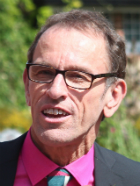 Martin Stevens is Senior Research Fellow at the Social Care Workforce Research Unit at King’s. (1,276 words)
Martin Stevens is Senior Research Fellow at the Social Care Workforce Research Unit at King’s. (1,276 words)
I was pleased to be asked to chair a few sessions of this conference, on 2nd-4th August 2018, at St Mary’s Stadium, the home of Southampton Football Club. Overcoming the prejudice about all things Southampton inevitable in a Portsmouth resident, I have to admit it was a great venue.
This was the 7th International Health Humanities Network (IHHN) conference. The venue has alternated between the USA and Europe; this year the conference was run in collaboration with the Good Mental Health Cooperative and speakers and delegates came from the USA, Australia, Europe and Nigeria. The IHHN:
…provides a global platform for innovative humanities scholars, medical, health and social care professionals, voluntary sector workers and creative practitioners to join forces with informal and family carers, service-users and the wider self-caring public to explore, celebrate and develop new approaches in advancing health and wellbeing through the arts and humanities in hospitals, residential and community settings. (from the IHHN website)

St Mary’s Stadium, Southampton
For me, the conference served as a fascinating introduction to ‘Health Humanities’, about which I had previously only a vague idea. The first keynote speaker, Professor Paul Crawford provided a great introduction to this area, having been a very early proponent and champion for the most of this century. Professor Crawford described how health humanities developed from medical humanities, which aimed at broadening medical training to include elements of the humanities. The aim was to give doctors a broader base of knowledge and thinking, which was thought to increase empathy and to develop a commitment to working with professionals from other disciplines. Including study of philosophy, literature and other arts-based subjects aimed to help clinicians take a more interpretive view of illness, as well as be more able to take context into account (Crawford et al, 2010). Nurse training has also included elements of humanities, in order to help nurses appreciate the complexity of human experience and aid in developing problem-solving skills. Another speaker talked about her GP ‘prescribing’ a poem, which echoes ‘social prescribing (see King’s Fund website), where doctors prescribe various social and arts-based activities as part of treatment for physical and mental health conditions.

At the conference
However, Health Humanities aims to be wider still. One element of this over the past few years has been to expand the role of humanities in wider health care and allied professions and in promoting engagement with the arts as part of healing and recovery. This seems most clearly applicable to mental health, because of the central role for narrative and communication in treatment and ongoing support. In addition to incorporating medics’ and nurses’ understanding and awareness of the humanities and the therapeutic benefits of engagement in various kinds of arts, there is also a value in exploring, for example, historical understandings of disability and mental health, in developing conceptual understanding of the field. As Paul Crawford noted, the field has expanded enormously over the decade or so, with many research centres across the world and increasing support from research funders such as the Arts and Humanities Research Council, which funded several studies featured in presentations in the conference.
Speakers were from many of the disciplines collaborating in health humanities and included medical students, a dancer, and people from the fields of history and classics and archaeology. Presentations gave examples of a wide variety of applications and links between the humanities and health care and the study of health. A few examples serve to give a flavour of the ideas and approaches involved.

Conference participants
Ellen Adams discussed the links between disability studies and classical literature. She argued that archaeology and classics can be informed by understandings drawn from disability studies, comparing responses to broken statues from antiquity with modern depictions by and of disabled people. She argues that both these disciplines have neglected understandings of disability and mental health. In addition, Ellen outlined how understandings of disability evident in classical literature have remained in modern assumptions and thinking. For example, Homer’s blindness was seen at the time as connected with his ability to have deep poetic insights or other enhanced senses; these ideas can still be found in thought about sensory impairment. More seriously, ancient ideas about disability being a curse and a deformity can also be traced to modern disablist views. Overall, she concluded, health humanities have had little involvement with classics, which she felt could have a great potential for further understanding in both fields.

Florence Nightingale
A view from more recent history was also highlighted by two other speakers, focusing on the work of Florence Nightingale. Richard Bates explored Florence Nightingale’s ‘holistic’ approach to medicine, which he argued may have important lessons for today’s practice. While primarily known for her contribution to nursing, Florence Nightingale was an accomplished academic and a pioneer in the use of statistics. The importance for health humanities was her focus on the importance of reading (improving) literature and writing on recovery, primarily for soldiers injured in war, but also in civilian contexts. This was linked to a focus on ‘moral’ health and avoidance of alcohol as a way of promoting recovery, as an example of holistic thinking, which current policy makers and practitioners still struggle with. While the focus on moral health now seems out of place, the importance placed on reading seems very closely allied to some of the ideas of health humanities. A second speaker (Jonathan Memel) focused on Florence Nightingale’s pioneering work in public health, which grew out of regular visits to ‘the poor’ and an increasing concern with the impact of housing conditions on overall health. Memel argued that these approaches are of great relevance to ideas about public health re-remerging today.
All three of these papers illustrate how humanities can contribute to understandings of health in a very broad sense, and serve to show the value of working across these different academic spheres.
Many papers presented therapeutic involvement with the arts and humanities, mainly in relation to mental health. Lyn Shaw’s moving workshop was an excellent example. She was very honest about her own experience of Borderline Personality Disorder for many years. She also talked about her recovery, which was very much influenced by a course of ‘Mentalised Therapy’ and involvement with dance. Part of the presentation involved a documentary film in which she and a dance partner express some of her experiences with BPD. After showing and commenting on the film Lyn also talked about a planned approach to work with groups of people with BPD to develop dance choreography expressing their experiences, with possible involvement in dance performance, as a therapeutic experience. Other presenters reported on the use of a wide range of arts activities: poetry, story-telling, the use of voice and singing as part of therapeutic approaches to mental health.
As a social care researcher, I was very struck by the possible benefits of these kinds of approaches in supporting older people with dementia and people with learning disabilities, through social care services and support. We see many applications to the Social Care Research Ethics Committee exploring the potential for arts-based interventions in care homes, for example, although these often do not involve social care researchers. There is definitely scope for broadening the scope of health humanities into social care fields, and opportunities here are accentuated by the current opening up of the National Institute for Health Research’s remit into funding social care research.
Martin Stevens is Senior Research Fellow at the Social Care Workforce Research Unit at King’s.
Reference
Crawford, P., Brown, P., Tischler, P. and Baker, C. (2010) “Health humanities: the future of medical humanities?”, Mental Health Review Journal, Vol. 15 No. 3, pp.4-10, https://doi.org/10.5042/mhrj.2010.0654